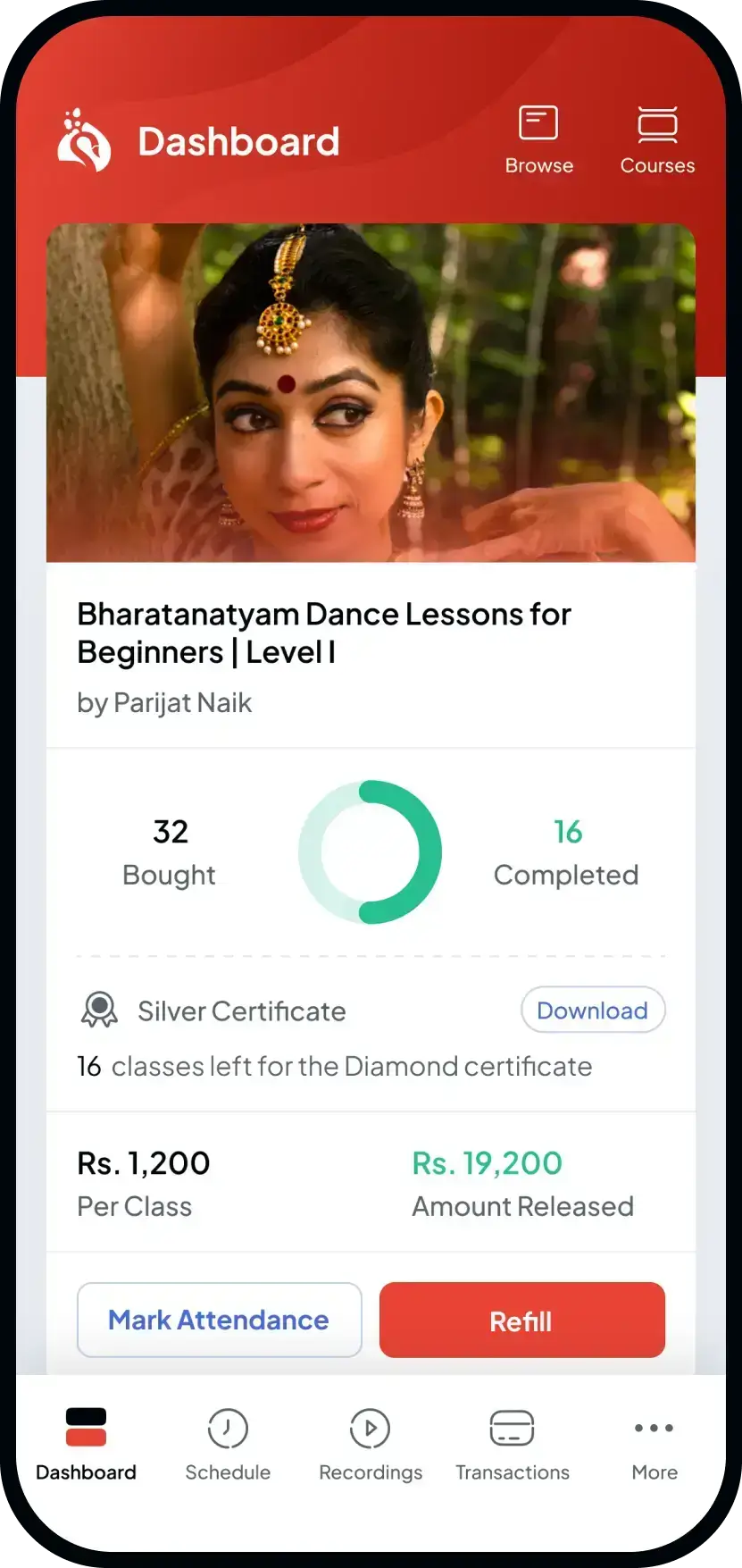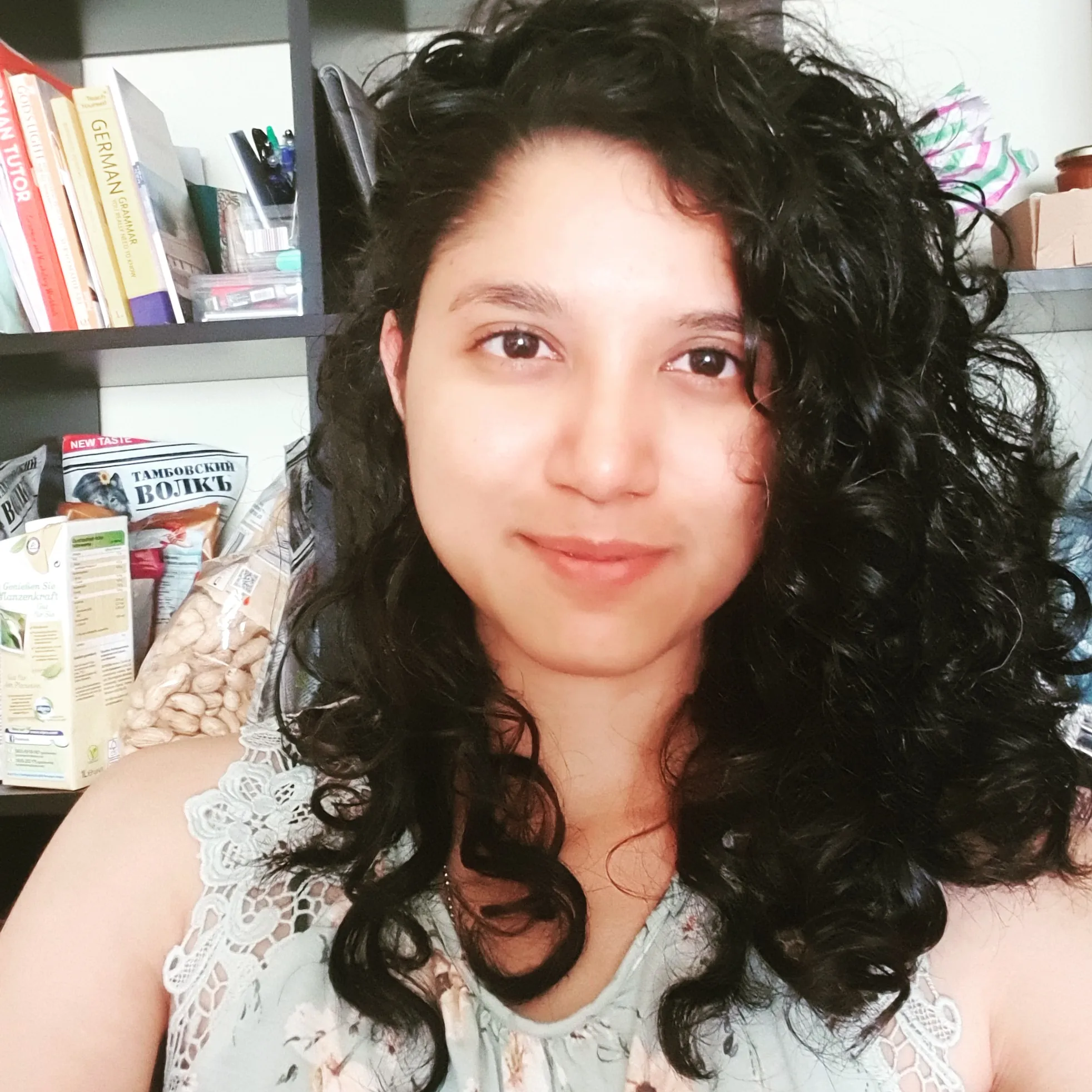Why people love ipassio?
World-class masters as teachers
Personalized & Interactive 1-on-1 classes
Course studio that amplifies learning
Access to the global creative community
Pay as you go - 2 classes at a time
World-class masters as teachers
Personalized & Interactive 1-on-1 classes
Show more
Explore Online Sitar Courses

Our Happy Learners

Real Progress, Real Impact
Let’s celebrate passion learning
About Online Sitar Classes
Looking for Sitar classes near me? Get the best Sitar lessons from top Sitar teachers. Learn Sitar online with us at ipassio.com.
Topics to be covered under Sitar lessons
Courses begin with laying a strong foundation on Hindustani classical that relies heavily on the Saptak & Sargams. Based on this, you’ll have a better understanding of Raags and Taals. A few of the ragas that’ll taught are yaman, bhupali, bageshree, todi and malkauns. A composition in 16 beats or teen tala will be taught on sitar with fixed taan and jhala. Alap which related to instrumental performances and Gamak will be taught. Gamak is the alankar that emphasizes on the raga’s individual characteristic.
How to learn Hindustani Sitar at home?
World renowned sitar masters offer live, 1 on 1 online sitar classes on ipassio. These include disciples of Pandit Ravi Shankar ji, Grammy nominees, and many others. Therefore students get access to such teachers directly from home. These sitar teachers are currently active with live shows and performances. Getting practical wisdom can be possible only through an online format. This eliminates you of the need to travel to local institutions to learn Sitar near you.
Why sitar classes online from ipassio?
If you want to learn Sitar basics or if you want to pursue advanced sitar training, our proficient masters can guide you to the right musical path, here at ipassio. Even for a complete sitar beginner, our courses can be deemed perfect. Since our format enables to learn Sitar online from home, you can conveniently be sitting at home and avail our lessons. Our teachers guide you in tuning sitar, sitting postures, hand positioning along with accurately guiding you in playing Sitar. Also, our teachers can assist you in buying a sitar. The make, price and other details that can be suggested by the teachers. It will help you in confidently making.
Learn Sitar tuning
Sitar tuning depends largely on the school/style of the player. Tuning as per Pandit Ravi Shankar’s style and Vilayat Khan’s style are different. Maihar gharana, to which Ravi Shankar belonged, used Kharaj-pancham sitar that has 7 playable strings, whereas Gandhaar-pancham sitar used by Vilayat Khan has only 6 strings. For every raga, sitar player has to re-tune the instrument. Strings are tuned by tuning pegs and by a bead threaded on each string that can be slid across for fine-tuning.
Major cities our students come from :
United States of America : New York, Los Angeles, Fremont, San Jose, Santa Clara, Chicago, Houston, Philadelphia, Phoenix, Dallas, Austin, Denver, Seattle, Detroit, Washington, Boston, Memphis, Nashville, Portland, Las Vegas, Sacramento, Colorado Springs, New Orleans
United Kingdom : London, Birmingham, Leicester, Slough, Leeds, Manchester, Glasgow, Liverpool
India : Bengaluru, Pune, Mumbai, Kolkata, Delhi, Patna, Hyderabad, Chennai, Jaipur
Every musical instrument pose certain initial challenges. And Sitar is no exception. But our teachers at ipassio has years of experience in navigating students through those initial challenges. The lesson plans are also customized to factor in your strength and weakness in the context of learning Sitar online.
There are several ways to learn sitar online. There are pre-recorded online resources. Some of them are free while others are chargeable. You can learn Sitar on your own through these resources. But the best way you could learn the sitar is through live lessons, exclusively held for students on ipassio. With premium-quality courses that are carefully curated for students by acclaimed educators, you can pave your way to learning the sitar in the best possible way, from the comfort of your home or any other surrounding of your choice.
It is better to start practicing regularly for half an hour to one hour in the initial phase. Later it can be increased slowly to one and a half to two hours.
The duration for the classes depends upon the level of the course, age and health parameters of the student. In the initial few classes, the students take time to get used to the sitting position an holding the instrument properly. They learn abut the correct hand positioning and finger movements. Students of different age groups adapt these initial lessons in different ways. Small children have shorter attention span. Hence the beginner level classes are kept for shorter duration between 30-45 minutes. The duration increases to 60 minutes or even 90 minutes for some courses as the students reaches higher levels.
Learning the sitar offers many benefits. It helps improve concentration and patience. Playing the sitar develops hand-eye coordination and fine motor skills. It also enhances your understanding of rhythm and melody. Learning this instrument connects you with Indian classical music and its rich cultural heritage. Additionally, playing music can reduce stress and provide a sense of accomplishment and joy. It also fosters creativity and self-expression.
There is no strict minimum age to start learning the sitar. However, children around the age of 7 or 8 often have the physical strength and finger dexterity needed to play the instrument. At this age, they can also focus better and follow instructions more easily. That said, adults can start learning the sitar at any age too. The key is having interest, patience, and a willingness to practice regularly.
Online sitar learning classes can be good for kids below 10 years of age if managed well. They offer flexibility and access to skilled teachers who might not be available locally. However, there are several considerations. Ensure the child has a properly tuned sitar and the necessary accessories. Set up a quiet, comfortable practice space free from distractions. Choose a teacher experienced in working with young children to keep lessons engaging and age-appropriate. Monitor the child's posture and technique to prevent bad habits. Additionally, regular supervision during the online classes and constant encouragement from parents can help maintain motivation and progress.
No, 50 years of age is not too late to start learning the sitar. Learning a new skill like playing an instrument can be very rewarding at any age. It helps keep the mind active, improves concentration, and can be a great source of enjoyment and relaxation. Starting at 50 might present some challenges, such as building finger strength and flexibility. You could have any health issues like arthritis that might make it difficult for you to sit for long hours. Hence, it is advisable to consult your physician in such cases. Finger strength can be developed with regular practice and guidance from a good teacher. ipassio offers live one-to-one classes. The lesson plan and teaching methodology are entirely customized. The most important factors are interest, dedication, and a willingness to practice regularly.
For beginners, especially those learning sitar, the Ravi Shankar style sitar (also known as Kharaj Pancham or KP sitar) is often recommended. This type of sitar is designed with an extra set of sympathetic strings, which enhances the resonance and sound quality, making it easier for beginners to produce a pleasing sound. These sitars are typically well-constructed and durable, providing a good balance between quality and affordability. They produce a rich, full sound that is ideal for learning the nuances of Indian classical music. Ravi Shankar style sitars are widely available, making it easier to find one that suits your budget and preferences. Many teachers recommend this type because of its versatility and ease of play for beginners. When choosing a sitar, consider factors like budget, the availability of a good teacher, and whether you can try the instrument before purchasing. It's also beneficial to buy from a reputable dealer who can ensure the sitar is properly set up and tuned.
Not having a background in music should not discourage you from learning the sitar. You will find some of the best sitar players and teachers from all across the world on ipassio.com. You can interact with them in a free meeting. Your teacher will evaluate your potential and guide you accordingly. You can also discuss your inhibitions and concerns with them. If you have the will to become a successful sitar player, our teachers at ipassio will surely find a way to make it happen.
The online Sitar learning courses on ipassio are divided into different levels such as beginners, intermediate, advanced, and professionals. A specific lesson plan is designed for each level with a clear goal that the student will achieve at the end of the course. These courses ensure gradual progress and mastering each skill set step-by-step. The aim is to provide a holistic learning experience for hobbyists and professionals. Further, these courses are customized to accommodate the student’s aspirations and learning objectives.
Online sitar learning classes on ipassio.com are certainly very effective. They offer convenience in scheduling and learning from home. They provide access to teachers worldwide, including experts not available locally, which broadens learning opportunities. All you need is a stable internet and suitable equipment.
Yes, you will be awarded Certificates of Accomplishment by ipassio upon reaching (completing) certain levels across your journey.
How soon you can pick up the nuances of playing sitar completely depends on your learning speed. It certainly varies from person to person. If you want to become a professional sitar player, you should devote more hours to practicing Sitar. You should be playing simple melodies in six months to a year of learning sitar. Mastery of the sitar, allowing for advanced techniques and complex compositions, usually requires several years of dedicated learning and practice. Ultimately, your progress will depend on your commitment, the quality of your instruction, and the time you invest in practicing regularly.
Yes. Since these are entirely customized courses, you can certainly share your wishlist. However, whether to teach it or not will be decided by the teacher after evaluating your abilities.
No. There is no trial class as such but you have a free meeting with the teacher where you can discuss your learning objectives and ask questions about the classes, way of instruction, and any other questions you have in mind about the course.
The geographic location and timezone will never come in the way of your learning. The teachers at ipassio are available to teach students from different time zones. You can discuss it with the teacher and decide on a mutually agreeable time for the class.
Additional Resources
How ipassio works?

Pick your passion
Ranging from music to creative arts, pick what you love!

Interact with an expert
Connect with your teacher over a free 1-on-1 video call to discuss your learning goals.

Set session schedules
Get session schedule matching your timezone

Pay as you go
2 classes at a time, with no long-term commitments.
Start with a free meeting now!
Pick a Course

Student
Teacher
Download our app and get going with your passion.
Get easy access to the pool of world-class educators, enthusiastic learners and everything exciting!
- Explore hundreds of courses from 400+ teachers
- Enroll easily into the course of your choice
- Mark attendance for every class you have completed
- Buy and refill classes with ease
- Schedule classes as per your availability
- Teachers can easily withdraw their fees











